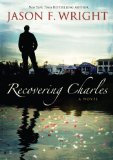Once again, I’m catching up with the last of the reviews for my Summer Reading Thing list. Website review tomorrow, and be sure to participate in the craft book club poll!
I received this book as a freebie with my registration packet at a conference I attended in April. As you might expect, for a free book I didn’t pick myself, my expectations were pretty low.
(Okay, so maybe some evil part of me secretly resented having this foisted upon me and I was hoping I wouldn’t like it. But that’s the evil part. I don’t really listen to that. That often.)
 In Recovering Charles, Luke Millward has a difficult relationship with his parents. His mother descended into depression and prescription painkillers after her own mother’s death, and eventually committed suicide. His father, Charles, was also incapable of dealing with his grief and devolved into alcoholism. Luke grew up to become an award-winning freelance photographer—and have little contact with his father.
In Recovering Charles, Luke Millward has a difficult relationship with his parents. His mother descended into depression and prescription painkillers after her own mother’s death, and eventually committed suicide. His father, Charles, was also incapable of dealing with his grief and devolved into alcoholism. Luke grew up to become an award-winning freelance photographer—and have little contact with his father.
It was kind of ironic that I ended up reading this book this weekend—four years after Hurricane Katrina. In Recovering Charles, Luke receives a call in the wake of Katrina. His estranged father had settled there—and now he was missing. Luke finally resolves to go to New Orleans to recover his father’s body. But he never expected to find his father’s legacy.
The beginning was a little odd, since not a whole lot was happening in the present, and we were regularly thrown back into fragmented flashbacks. However, once Luke actually got to New Orleans, I really understood where he was coming from, and how he felt about his father (and the flashbacks stopped).
One big coincidence in the book seemed just a little too big. I’ve read before that coincidence in fiction is okay—but you really have to set it up, and usually it’s better if the coincidence doesn’t resolve a problem. But in all, I enjoyed the book. I liked learning about who Luke’s father had become and seeing Luke come to understand how people can change.
What do you think? How big of a coincidence is too big? Is coincidence better as an inciting incident or a resolution?
